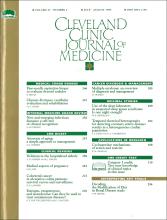ABSTRACT
BACKGROUND Physiologic changes during pregnancy can precipitate or exacerbate potentially serious maternal illnesses that may adversely affect the outcome for both mother and fetus.
OBJECTIVE To review the common medical conditions that may complicate pregnancy.
SUMMARY Venous thrombolembolic disease is the most common medical disorder complicating pregnancy; heparin is the safest and most effective treatment and prophylactic agent in high-risk patients. Systemic lupus erythematosus may flare during pregnancy and may require therapy with corticosteroids, which may also be needed to treat immune thrombocytopenic purpura. Hypertension should be monitored closely throughout the pregnancy and puerperium; certain antihypertensive agents control blood pressure without affecting the fetus. Asthma may worsen or improve during pregnancy; therapy is similar to that for nonpregnant women. Diabetes mellitus may antedate pregnancy or become manifest during pregnancy; detection and strict glycemic control are the keys to a successful outcome. Approximately 30% of infants born to mothers with established HIV infection acquire the syndrome of immunodeficiency; testing must continue until 15 months of life. Mothers with epilepsy should use the lowest effective dose of a single antiepileptic agent to prevent congenital birth defects.
CONCLUSIONS When the internist, obstetrician, anesthesiologist, and perinatologist use a team approach, most patients can expect a successful outcome.
- PREGNANCY
- PREGNANCY COMPLICATIONS
- THROMBOSIS
- LUPUS ERYTHEMATOUS
- SYSTEMIC
- PURPURA
- THROMBOCYTOPENIC
- HYPERTENSION
- ECLAMPSIA
- HEART DISEASES
- HEART DEFECTS
- CONGENITAL
- ASTHMA
- PREGNANCY IN DIABETES
- HIV INFECTIONS
- EPILEPSY
- Copyright © 1994 The Cleveland Clinic Foundation. All Rights Reserved.






